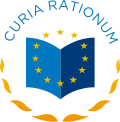The main bodies of the European Union and Euratom are:
Contents
- Institutions of the EU
- International law entities of the EU (other than EBC)
- European Investment Bank Group bodies
- European University Institute
- European Stability Mechanism
- Unified Patent Court
- Other treaty-established bodies
- Advisory bodies
- European Ombudsman
- Agencies, decentralised independent bodies, corporate bodies and joint undertakings
- Other bodies and inter-institutional services
- References
- See also
- the seven principal institutions of the European Union, including the one which is an international entity (the European Central Bank)
- other bodies of the EU established through primary (treaty) legislation, either as international law bodies (the European Investment Bank Group entities, the European University Institute, the European Stability Mechanism and the Unified Patent Court) or as bodies without juridical personality (the European Ombudsman, the advisory bodies to the European Union)
- the agencies, decentralised independent bodies and joint undertakings of the European Union and Euratom, which are bodies of the EU established as juridical persons through secondary legislation,
- other bodies of the EU established through secondary legislation, which lack juridical personality (e.g. European Data Protection Supervisor)
- the inter-institutional services
Apart from them, some several other bodies exist.










